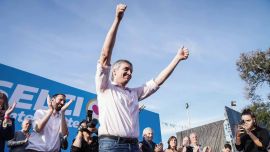The resignation of Peruvian President Pedro Pablo Kuczynski this week represents a crowning moment in the regional corruption mega-scandal involving the graft-ridden Brazilian contractor Odebrecht. Cornered by a second impeachment vote in three months (the first was frustrated only by sibling rivalries within the Fujimori family heading the opposition, and by the desperate move of a pardon for that dynasty’s founder, the disgraced 1990-2000 president Alberto Fujimori), Kuczynski had no choice but to end his presidency prematurely in the second year of a five-year term.
If Argentina had a moment of multilateral glory in the past week with the G20 ministerial meeting, Peru’s lies just ahead with next month’s Americas Summit in Lima (with or without Donald Trump?) – this doubtless simultaneously stimulated Kuczynski’s desire to hang on a little longer but also the need for him to go quickly in order not to overshadow the big event with his saga of scandal. At the same time it is worth asking perhaps what value multilateralism has right now with trade wars looming across the planet in these days of rampant protectionism and nationalism, a stage which could almost be described as post-globalisation.
The main story of Kuczynski’s downfall is the Odebrecht scandal but it also carries a cautionary tale, one which the Mauricio Macri administration in particular should heed. During almost three decades since its economic disintegration under the first Alan García presidency, Peru has been one of the most spectacular success stories of the region, thanks to foreign investment but also in large measure to a remarkable continuity of economic policy under presidents of almost every possible ideology (the authoritarian Fujimori, politicians of the right and left, nationalists and globally trained technocrats, even García himself). Low in charisma at the age of almost 80 and with a gringo accent but rich in financial and international experience, Kuczynski should have been the final consolidation of this trend – instead he had no answers to the dysfunctional politics and institutional disarray of Peru, over and above the Odebrecht scandal. President Macri insists that 20 years of three-percent growth will suffice to make Argentina a fully developed country but almost 30 years, three decades of economic success (with 19 straight years of growth until now) were not enough for Peru without addressing other aspects.
Brazil’s corruption scandal has left ravages all over the continent with Kuczynski out and his predecessor jailed in Peru, Ecuador’s vice-president also gone, the Colombian and Mexican presidents both under fire and the Brazilian birthplace of this volcano in total limbo in its electoral year with anything possible. But here we should ask a more pertinent question for our local audience: what is happening here in Argentina? Almost nothing. Even though US$35 million in Odebrecht graft here has already been disclosed, it is likely just the tip of the iceberg.
When a government keeps a lid on corruption, the usual assumption is that it has something to hide, and then it is just a question of finding out what. But the dealings with Odebrecht were almost exclusively the work of the preceding Cristina Fernández de Kirchner administration so their full exposure would have the added attraction for the current government of not only serving justice but also political advantage. The ex-president might protest “political persecution” when the corruption cases against her are in the hands of a local judge like Claudio Bonadio but the claim loses credence if the accusations and evidence are coming from outside. Neither the strategic perception of Kirchnerism as the ideal electoral opponent, nor a desire to protect AFI intelligence chief Gustavo Arribas (a man who has faced claims of alleged wrongdoing linked to Odebrecht) seem satisfactory explanations for this inaction – why the Odebrecht scandal is so dormant here remains a valid question.
Nor is President Macri encouraging on other fronts at present. For example, nominating a City judge from his own circle like Inés Weinberg de Roca as the next attorney general – it might be argued that Fernández de Kirchner was no better and that may be true, but the president’s Cambiemos (Let’s Change) administration is supposed to be different. Postponing Finance Minister Luis Caputo’s Congress hearing over his offshore interests might be excusable in a G20 week, with 22 of his most important foreign counterparts and 17 top central bankers in town, but there can be no further delay, especially considering the way Labour Minister Jorge Triaca was shielded earlier this year. “Confidence shocks” are often urged to kickstart economies – perhaps the government needs one now for transparency.


















Comments